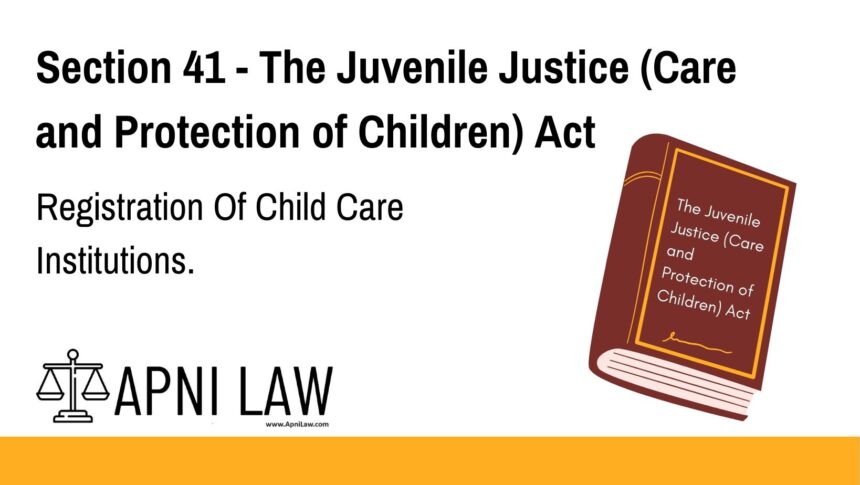Code: Section 41 JJ Act
(1) All institutions, whether run by the State Government, voluntary, or non-governmental organisations, that house children in need of care and protection or children in conflict with the law must be registered under this Act, regardless of whether they receive grants from the Central Government or State Government. Institutions that were registered under the Juvenile Justice (Care and Protection of Children) Act, 2000 will be deemed to have been registered under this Act upon commencement.
(2) The State Government, after considering the District Magistrate’s recommendations, shall determine and record the institution’s capacity and purpose upon registration. It will register the institution under one of the following categories:
- Children’s Home
- Open Shelter
- Specialised Adoption Agency
- Observation Home
- Special Home
- Place of Safety
(3) Upon receipt of an application for registration, the State Government may grant provisional registration for up to six months to existing or new institutions. The institution must meet the prescribed criteria within six months to retain the registration. If the institution fails to meet the criteria, the provisional registration is cancelled.
(4) If the State Government does not issue a provisional registration certificate within one month of receiving the application, the application receipt itself will be treated as provisional registration for up to six months.
(5) If the application is not disposed of within six months, it will be regarded as dereliction of duty, and departmental proceedings will be initiated against the officers involved.
(6) The registration of an institution is valid for five years and is subject to renewal every five years.
(7) If an institution fails to provide rehabilitation and reintegration services, the State Government may cancel or withhold the registration. In the meantime, the State Government will manage the institution.
(8) All registered child care institutions must admit children, as directed by the Committee, within their capacity, regardless of whether they receive government grants.
(9) The inspection committee, appointed under Section 54, has the authority to inspect any institution, even if it is not registered, to determine whether it houses children in need of care and protection.
Explanation of Section 41 JJ Act
Registration of Child Care Institutions
- Mandatory Registration
All institutions housing children in need of care and protection or children in conflict with the law must be registered under the Juvenile Justice Act. This applies to institutions run by the State Government, non-governmental, or voluntary organisations. Registration ensures that these institutions are regulated and adhere to the standards outlined in the Act. - State Government’s Role
The State Government, after reviewing the District Magistrate’s recommendations, registers institutions by determining their capacity and function. Each institution will be categorized (e.g., Children’s Home, Specialised Adoption Agency, etc.) to ensure it aligns with the required standards. - Provisional Registration
Institutions that apply for registration may be granted provisional registration for up to six months, allowing them to comply with the necessary standards. If the criteria are not met within six months, the provisional registration will be revoked. - Dereliction of Duty
If the State Government does not address the application within the stipulated time frame, it is considered dereliction of duty. Appropriate action will be taken against the officers involved. - Registration Validity
Once registered, institutions will have a five-year registration period. The institution must apply for renewal every five years to continue operating under the Act. - Failure to Provide Services
If the institution fails to provide necessary rehabilitation services, the State Government may cancel its registration. Until the institution meets the required standards, the State Government will oversee its management. - Admission of Children
Child care institutions must admit children as directed by the Committee, within their capacity. This ensures that no eligible child is denied care and protection based on funding. - Inspection Rights
Even unregistered institutions are subject to inspection by the committee to ensure they are providing adequate care to children in need.
Illustration
Example 1: Provisional Registration
An institution submits an application to be registered under the Juvenile Justice Act. The State Government grants provisional registration for up to six months, giving the institution time to meet the required criteria.
Example 2: Dereliction of Duty
The State Government fails to process an application for registration within the six-month time frame. As a result, the officers involved face departmental action for dereliction of duty.
Common Questions and Answers on Section 41 JJ Act
- Do all institutions need to be registered?
Yes, all institutions housing children in need of care and protection or children in conflict with the law must be registered under the Act. - What happens if the registration application is not processed in time?
If the application is not processed within six months, it is considered dereliction of duty, and departmental proceedings will be initiated against the responsible officers. - What is provisional registration?
Provisional registration is a temporary registration granted to institutions for up to six months while they work on meeting the required criteria. - How often must an institution renew its registration?
Registration is valid for five years and must be renewed every five years. - Can unregistered institutions be inspected?
Yes, even unregistered institutions can be inspected by the inspection committee to check if they are housing children in need of care and protection.
Conclusion
Section 41 of the Juvenile Justice Act ensures that all institutions housing children in need of care or in conflict with the law are properly registered and regulated. This helps provide adequate care and protection to children and ensures accountability in the institutions that serve them.
For more details on child welfare laws, visit ApniLaw.








